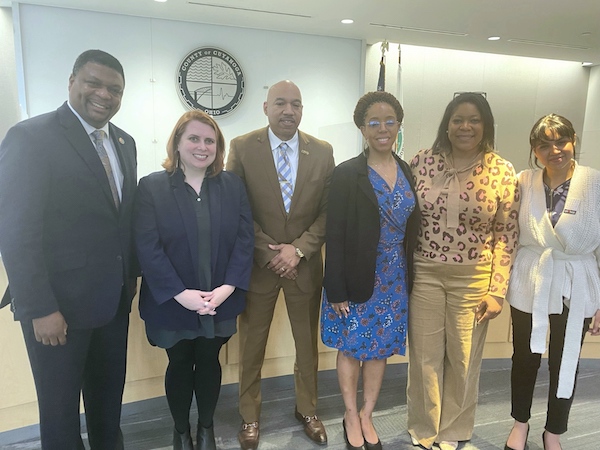Student and community activists galvanize movement that removed slaveholder’s name from public institution

Cuyahoga County Council President Pernel Jones Jr., Emily Forsee, Bob Ivory, Stephanie Goggans, Cuyahoga County Councilwoman Meredith Turner and Nabeth Manaa. Forsee, Goggans, and Manaa are all third year law students at Cleveland State University School of Law.
In the wake of the social unrest following the May 2020 lynching of George Floyd by Minneapolis policemen, Stephanie Goggans, a third-year law student at Cleveland State University, thought her law school should emulate the action taken by the University of Chicago to remove the name of the renowned Chief Justice John Marshall from the school’s official name.
Marshall, while perhaps the most important jurist in the nation’s history, was also an unrepentant slaveholder and slave trader who almost unfailingly ruled enthusiastically in support of the nation’s nineteenth century slavery regime.
Last week, more than two years after Goggans and others initiated a demand for change, Cleveland State University’s board of trustees unanimously voted to change the name of Cleveland-Marshall College of Law to Cleveland State University School of Law.
“It was the result of a small group of law students, community leaders, Cleveland city council, the NAACP and The Norman S. Minor Bar Association. All of them propped us up,” said Goggans. “We were just trying to advocate for something better.”
Goggans said the process that resulted in the historic November 17 vote took so long because, initially, no one took the students seriously. There were also major concerns about losing alumni and donor support if the name was changed.
Goggans, who took up the charge with classmate Emily Forsee and Hanna Kassis, an attorney and alum of Chicago School of Law, recalled the lengthy struggle. She said they studied the process, started a petition on change.org, and made the request to the school’s administration.
Unsurprisingly, the trio met resistance from law school alumni, administrators, and the board.
“A lot of alumni didn’t want the name to change,” said Goggans. “How is that a welcome to the profession?”
Goggans said she knew she wouldn’t be able to work in certain places in this city if they continued to push for the change. Before making the decision to persevere, she talked to family and friends about her choices. They encouraged her to do what’s right, she said. Ultimately, given CSU’s claim to be a diverse, inclusive, and equitable institution, she and Forsee felt they needed to hold the school accountable.
Goggans and Forsee, a white woman, elected to be the spokespeople for the campaign. “It was easier logistically for me and Emily to be out front. The younger students don’t have leverage. We just put it on our backs,” said Goggans. “It was the right thing to do.”
The students were encouraged by the parallel changes then taking place within the Cleveland Metropolitan School District (CMSD), prodded by Cleveland Ward 9 councilman Kevin Conwell. Goggans met Conwell while testifying during the first council meeting that reinstated public comments.
Conwell “stood up and spoke out,” said Goggans.
Slowly, as what began as a student-led effort started to be taken more seriously by the university once the larger community got involved. Goggans said community leaders such as Cuyahoga County Councilmembers Pernel Jones Jr. and Meredith Turner, Congresswoman Shontel Brown, former State Senator Nina Turner, and education leader Bob Ivory provided support.
Even still, a faction of the community chose to attack them for insisting upon this change, said Goggans. “We were called antisemitic,” she said. “Eric Brewer [verbally] attacked us.”
At the end of the day, with the name finally being changed, Goggans is proud of what they’ve accomplished. “It’s going to inspire someone who didn’t think they had the power. You can speak up,” she said. “You have to decide what’s important. Advocacy is important.”
Goggans also said that while the name change has no direct correlation to increasing the number of people of color in the legal profession, currently at 5 percent, it does signal a step in the right direction.
“These little ways, these little steps, get people to change their views, to broaden their perspective,” she said.
Conwell, who sponsored the resolution in Cleveland City Council asking Cleveland State University to change the name of the law school, which passed unanimously, sees this as another victory in the battle for justice.
“I would like to personally thank Cleveland City Council for supporting the legislation unanimously; Cleveland State University President Laura Bloomberg for understanding the concerns of the students and the African American community; Lee Fisher, dean of the school of law; and Cleveland State’s board of trustees for voting to change the name.”
Conwell, along with his wife, county councilwoman Yvonne Conwell, also plans to publicly recognize Goggans, Forsee and the other students for championing this effort, on behalf of city residents, during the Dec. 5th city council meeting.
• • •• • •













